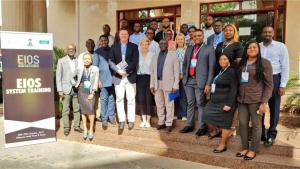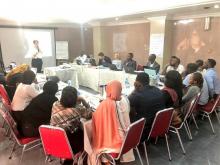WHO supports Nigeria to become first African country to adopt new epidemic intelligence tool
Abuja, 8 November, 2019 - In the short time it has existed, Nigeria’s public health institute, the Nigeria Centre for Disease Control (NCDC), has reported, averted and controlled a myriad of disease outbreaks. A key factor in preventing either the occurrence or the spread of these outbreaks has been their early detection.
Detection includes two types of surveillance: indicator-based surveillance and event-based surveillance (EBS); the latter looks at reports, stories, rumours and other information about health events that could be a serious risk to public health.
In a bid to strengthen EBS within NCDC, the World Health Organization (WHO) recently supported the introduction of the Epidemic Intelligence from Open Sources (EIOS) tool, making Nigeria the first country in Africa to adopt the platform.
Following its introduction, WHO and the US Centers for Disease Control and Prevention (CDC) organized a training course on how to use the tool. A total of 28 participants, largely drawn from NCDC attended the three-day workshop in Abuja on 31 October, 2019.
Speaking at the start of the session, WHO Nigeria’s Officer in Charge (OiC), Dr Peter Clement, said: “I wish to appeal to all trainees here to optimally utilize the EIOS tool to complement current efforts to detect outbreaks.”
Womi Eteng, the senior technical advisor to NCDC’s director general, welcomed the introduction of the platform.
“We are delighted to be the first country on the continent to use EIOS at country level,” Mr Eteng said. “We believe that this tool will strengthen our capacity for epidemic intelligence thereby contributing to our vision to protect the health of Nigerians.”
The EIOS initiative is a collaboration between WHO, the Global Outbreak Alert and Response Network (GOARN), the Food and Agriculture Organization (FAO), the World Organisation for Animal Health (OIE), the Africa Centres for Disease Control and Prevention (Africa CDC), the Joint Research Centre of the European Commission (JRC), and the European Centre for Disease Prevention and Control (ECDC), CDC, the Public Health Agency of Canada (PHAC), Japan’s Ministry of Health, Labour and Welfare, Mexico’s Ministry of Health and Public Health England (PHE) as part of the Global Health Security Initiative.
The goal of the initiative is to create a unified, all-hazards, One Health approach by using open source information for early detection, verification and assessment of public health risks and threats. By combining human expertise and technology, the EIOS initiative integrates global alert and response efforts for public health emergencies and supports the core capacity requirements required in the International Health Regulations (2005). The EIOS initiative is a network of public health organizations with one common goal: to improve global health by preventing illness and saving lives through early warning for rapid response.




